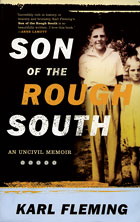 |
Some books can be read passively — the story line or just the exceptional prose flooding your mind and transporting you to another state of being. But that’s not an option with Son of the Rough South: An Uncivil Memoir by Karl Fleming (PublicAffairs, 2006 paperback edition). Born into poverty and social inequality in eastern North Carolina, the author — a newsman who tracked the turmoil of the civil rights era — uses his experiences to illuminate universal human traits.
Fleming’s stark depiction of his early life conveys his family’s economic and emotional destitution as first his father and then his stepfather die, his mother’s health begins to fail, and he is sent to the Methodist Orphanage in Raleigh. The regimentation of his life there does provide a measure of stability, even as it reinforces his sheer loneliness. And as Fleming tells of discovering his talent as a reporter, his voice becomes more richly confident.
Son of the Rough South is a straightforward sharing of an astute observer’s experiences, both internal and external, as he reports on landmark events of a painful collective past that we often choose not to look at closely. Fleming witnessed that pain as a lead reporter for Newsweek, and he revisits it now, enhanced by a retrospective understanding of how his own rough background cultivated the empathy and compassion that kept him on the ramparts for so many years.
Jumping from paper to paper (including a stint at the Asheville Citizen in the ’50s), Fleming eventually landed at Newsweek‘s Atlanta bureau, where he began to build a national career around the nascent civil rights movement. “I was powerfully drawn to this story, more than to any other, right from the start,” he writes. “It was the underdogs against the bullies, and I immediately and strongly identified with the underdogs.”
After that, Fleming’s life traced the outline of major news events across the South: the Student Nonviolent Coordinating Committee, which staged the first successful sit-ins at segregated lunch counters in Greensboro; Martin Luther King Jr.’s growing influence through the Southern Christian Leadership Conference; Vernon Jordan of the NAACP. Fleming covered mass meetings in black churches that led to freedom marches across the region as African-Americans pressed for the right to register and vote, attend all-white schools, and claim dignity and respect amid an atmosphere of hatred, fear and violence.
The author was present when James Meredith became the first black student at Ole Miss; he covered the murder of activist Medgar Evers and the tragic bombing of the Sixteenth Street Baptist Church in Birmingham, where four little girls were killed: “Pieces of paper were mixed among the dust, fabric (dresses had been blown off some of the girls), and broken bricks.” He reported on John F. Kennedy’s assassination and the subsequent shooting of Lee Harvey Oswald in Dallas. He reported on the 1964 Freedom Summer, when white college students from outside the South joined veteran civil rights workers for nonviolent demonstrations in Mississippi — a state that hadn’t integrated a single high school or elementary school 10 years after the Supreme Court ruled that segregation must end. Fleming recalls the harrowing requirements for the volunteers: $500 bail money, a list of next of kin, and a photo ID (to be released upon arrest, injury or death).
Arriving in Mississippi, Fleming learned that three volunteers were already missing: Mickey Schwerner and Andy Goodman (both “white kids from New York”) and James Chaney (“a black kid from Meridian, Miss.”). Their bodies were finally found savagely beaten, shot and buried in an earthen dam. Fleming’s assessment: “The flood of national indignation produced by the Mississippi murders finally gave Congress the political will to pass the Civil Rights Act.”
In early 1965, Fleming escaped the violence of the South to become the magazine’s Los Angeles bureau chief — only to be attacked and left bleeding and unconscious during the Watts riots. He assisted in Newsweek‘s coverage of the deaths of Martin Luther King Jr. and Robert F. Kennedy in 1968. But it all took its toll, and Fleming endured a period of personal breakdown. His eventual reintegration of those experiences produced this unflinching portrayal of the vulnerabilities and strengths of an individual and his society.



Before you comment
The comments section is here to provide a platform for civil dialogue on the issues we face together as a local community. Xpress is committed to offering this platform for all voices, but when the tone of the discussion gets nasty or strays off topic, we believe many people choose not to participate. Xpress editors are determined to moderate comments to ensure a constructive interchange is maintained. All comments judged not to be in keeping with the spirit of civil discourse will be removed and repeat violators will be banned. See here for our terms of service. Thank you for being part of this effort to promote respectful discussion.